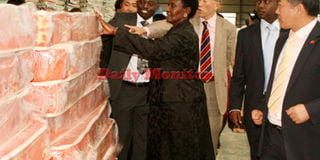‘Promote consumption of locally made goods’

Trade minister Amelia Kyambadde checks mattresses made in Uganda. Regional manufacturers want a policy that will compel people to buy locally manufactured goods. FILE PHOTO
What you need to know:
Challenged. The industrialists have been urged to be innovative.
Kampala. East African manufacturers have called for a policy that will, among other things, compel people from the region to buy locally manufactured goods.
The call was made during the first ever East African Manufacturers Business Summit (EAMBS) at Speke Resort Hotel in Munyonyo on Tuesday, where more than 500 manufacturers expressed disappointment over people from the region abandoning local products for Western goods.
East African Business Council (EABC) chairman Dennis Karera said he was dismayed by the fact that more than 70 per cent of goods used in the region are being imported from Western countries including those that can be accessed from member states.
“Our manufacturing industry cannot develop when we, local consumers, do not buy the goods. There must be sensitisation to change the mindsets of East Africans who believe that imported goods (from Western countries) are of better quality,” said Mr Karera.
He also challenged EA governments including local manufacturers to go beyond identifying problems hampering local manufactures but find solutions as well.
Uganda Manufacturers Association (UMA) chairman Amos Nzeyi also criticised regional governments for not giving local manufacturers priority while awarding tenders for projects such as roads and bridges.
“Although we appreciate the efforts our governments have made in reducing electricity charges, they should make sure local products are given the first priority in all national projects,” he said.
Mr Nzeyi added that there is need to introduce electronic flashcards to ease movement of goods within the region, as well as address trade imbalances.
“Statistics show that Uganda buys Kenyan products worth $700m whereas Kenya buys from us (Uganda) goods valued at $150m. This is enough to show that there is a big gap in balance of trade,” he said.
Mr Kassim Omar, the director of EABC, said it is discrediting for EA countries to import basic things such as needles, safety pins and gauze, among others.
“It is very shaming that with all the cotton grown in EA, we can still import things which we shouldn’t be importing by now. We need to be innovative if we want to catch up with the Western world,” Mr Omar said.
However, Bidco’s Vimal Shah told the industrialists to be innovative and embrace technology in order to produce goods that match Western products.
“This world is changing year in, year out. Technology is moving very fast. To match with the fast changing technology, our quality must be of good quality. This can be achieved through being innovative and applying technology in whatever we do,” said Mr Shah.
Removal of trade tariffs
Dr Richard Sezibera, the East African Community secretary general, appealed to the regional governments to remove cross border tariffs which he said were hindering the development of the manufacturing industry and the community in general.
“Our goods are taxed twice yet we are members of the East African Community. Goods are taxed before and after crossing to another country. This does not reflect the essence of the Community,” Mr Sezibera said.



